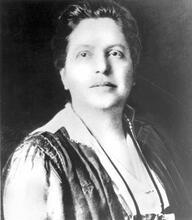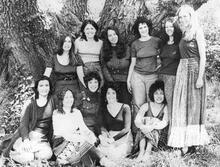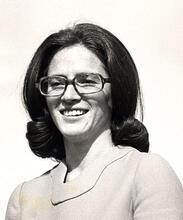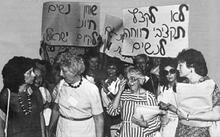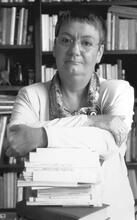Berta Blejman de Drucaroff
Born in Ukraine, Berta Blejman arrived in Argentina with her parents and siblings in 1905; they settled in the city of Bahía Blanca in the province of Buenos Aires. In 1924 she married Samson Drucaroff and moved to Colonia Rivera, where their three children born. They worked and were active community leaders. In 1935 the family settled in Buenos Aires, where Berta joined anti-fascist organizations to help the Republicans and later the Allies. She joined the Yiddish-speaking section of the Communist Party and in 1950 became the president of the YKUF/ICUF Women's Organization. She was a prominent promoter of reading circles (leien kraizn) and political and cultural activity of progressive Jewish women. Her self-taught training in Marxist theory and women's rights was reflected in numerous publications of the ICUF milieu.
Early Life & Education
Berta Blejman was born in Cologne Ingulietz (now known as Ingulec), in the governorate of Gershon, in the Russian Empire (now Ukraine), on May 15, 1903. She was the youngest of six siblings and was two or three years old when the family arrived in Argentina in 1905. They moved to Bahía Blanca, an industrial town in the south of the province of Buenos Aires with an important Jewish community. Her father, Jaime Blejman (1855-1936), worked as a metalworker and her mother, Eva Shoj (1874-1957), took care of the home and children. They lived a very humble life and had to work hard to survive and could not learn Spanish. However, in his free time, Jaime frequented the Bahia Blanca library, where he read a book in Russian every week, and Eva learned to read Yiddish, in spite of the endless domestic chores.
Although all of Berta's siblings went to primary school, they had to work from childhood to help the family. Prior to emigration, her sister Fanny, fifteen years older, had worked with populist revolutionaries to overthrow the Tsar. In Argentina, Fanny encouraged Berta to read and study and served as her role model. However, she died unexpectedly of a heart attack at the age of 30 years. Her death was very traumatic for fifteen-year-old Berta.
Berta completed a teacher training high school and graduated as a public school teacher. She dreamed of studying child psychology and pedagogy at university, but her marriage to Samson Drucaroff in 1924 changed her plans. Her husband, three years older than she, had just graduated as a dentist, and the couple moved to Colonia Rivera in search of job opportunities. This agricultural colony, located on the border of the provinces of Buenos Aires and La Pampa, was founded in 1904 at the initiative of the Jewish Colonization Association. With the help of relatives, the young couple rented a small house and set up a dental surgery, where Samson practiced and Berta assisted him. Their three children were born in Rivera: Simon in 1925, Ofelia in 1926, and Leda in 1930. In 1934, due to an illness, Berta traveled for the first time to the capital of Buenos Aires and was impressed by the big city, where the couple moved with their small children in 1935.
Communist Involvement
Berta and Samson participated in the founding of the Jewish Cultural Center of Rivera and were active in Yiddisher groups linked to the Communist Party. Samson managed to get his first patients in Buenos Aires thanks to his contacts with the Yiddish-speaking progressive Jewish sectors. Most of his patients were Comintern sympathizers and, after 1937, belonged to the Idisher Cultur Farband (ICUF/YKUF, or Yiddish Cultural Association), the most radical of the several leftist Jewish organizations in Argentina. Samson threw himself into antifascist activism, and in 1936 he travelled to the USSR. These were very difficult months for Berta, because they had no money and all three children became ill.
One day, two unknown women rang Berta’s doorbell. They explained that they were members of the Communist Party and told her about their ideals and the important role of the women in the politics of emancipation. They invited her to the women´s meetings of the Party: "If your husband, Dr. Drucaroff, joined the Party, why not you?” they asked. Her daughter Leda remembers:
For the first time in her life, my mother discovered that as a woman, she could do more than just prepare a borsch, clean, serve breakfast, help my dad in the office, open the door to patients, iron, take care of her children. So, she accepted and completed the enrollment forms. However, when 6:00 p.m. arrived and my father returned, and was about to leave again for a Party meeting, my mother gave him the news. He was astonished and only managed to ask, "What are you going to do there?" Her answer was "If you can be a member of the Party, so can I. Women also have the right to integrate a movement and play an important role in society. I studied to teach. This is my chance to do something for the others and myself. My Dad was very surprised, but he could not say anything. My mother told me this story many and many years later1.
Thus Berta began her committed militancy in the Yiddish-speaking section of the Communist Party and progressive sectors, while continuing to take care of her children and household chores. During the Spanish Civil War and the Second World War, the number of women in anti-fascist organizations increased steadily, and the responsibilities assigned to Berta, who was perfectly fluent in Yiddish and Spanish, grew in size and scope. She began to read Marx, Lenin, Gorky, and other left-wing European literature incessantly, a task she continued throughout her life.
Berta wrote many articles for progressive Jewish newspapers and magazines, participated in partisan events, and encouraged women's gatherings. Soon Berta and Samson began taking their three children with them to the evening meetings. Their daughter Leda remembers the endless talks of "Marxist theory" that, as children, they had to listen to for hours, in uncomfortable chairs and in silence.
Beginning in the early 1940s, Berta became one of the leaders of the Israelite Women's Commission in Solidarity with Allies. The Commission had 25 branches in Buenos Aires and eighteen in the provinces, with 42 sewing and knitting workshops, and their clothing campaigns for the people of Stalingrad reached 5000 women. They sewed 5000 skirts, 3000 pairs of trousers, and 2000 dresses for the fifth shipment of clothing sent to the USSR in 1943.
ICUF Women’s Organization
When the Second World War ended, many women who had led these aid organizations turned their activism to women's work in ICUF institutions: school commissions, the Zumerland summer camp for children, the legendary Idisher Folks Teater (IFT, Yiddish Folk Theater), and, above all, reading circles (leien kraizn) in Yiddish and Spanish. The leien kraizn in the ICUF institutions, conceived by Berta as "real Universities to elevate women's culture," laid the foundation for the creation of the ICUF Women's Organization.
The ICUF Women's Organization (Organización Femenina del ICUF, OFI) was created on July 15, 1947, presided over by Catalina Perelstein, who was succeeded by Berta Blejman de Drucaroff in 1950. Made up of notable progressive Jewish woman, artists, teachers, and intellectuals, OFI was an organization parallel to the communist Argentine Women's Union (UMA). Through its magazine, Di idishe froi (The Jewish Woman), the organization advocated for women’s important work as mothers, peace in the Middle East, the education of women and children, general women's cultural development, and recognition of socialist countries and the new egalitarian place of women in those societies.
In 1957 in Buenos Aires, the OFI held the First Congress of the Women's Organization with the participation of women's delegations from Brazil and Uruguay. Berta, as president, received 500 activists from all over the country and gave the inaugural speech, emphasizing, with great erudition, the historical and universal struggle of women. Although most of the women spoke Yiddish, they reaffirmed their status as citizens of the countries in which they lived, a stance that was very important for all progressive Jewish groups. In spite of their deep commitment to the country, Berta and Samson were persecuted for being "communists," suffered the consequences of Law 4144 (passed in 1902 to authorize the government to prevent the entry of or expel foreigners “whose conduct affects national security or public order”), and were never able to apply for citizenship. Among other consequences, they could not vote.
Berta was an effective advisor not only on women's issues but also on general economic and institutional issues. She was a highly respected and beloved personality. She was a great friend and comrade of many prominent left-wing Jewish women, including Fanny Jacovsky de Edelman, Alcira de la Peña, Raquel Alperovich, Rosa Flechner, Sara Shepiursko, Mimi Pinzon (Adela Shliapochnik), Leike Kogan, and the actresses Jordana Fain and Cipe Lincovski, among others.
In her role as president of the OFI beginning in the 1950s, Berta began to travel through Argentina's provinces, encouraging the organization of reading circles and women's political work in Mendoza, Santa Fe, and Córdoba, among other localities. In 1956, there were 40 reading circles throughout the country, with more than 1000 participants. Cultural work among progressive women's groups was a political task for Berta, and followed Soviet guidelines. However, Berta did not always agree with directives of the Party. Sometimes she suffered the injustices in the Soviet world in silence, but the rigid party discipline was a sine qua non in the Cold War. Berta became one of the most prominent leaders of the Communist Yiddishist sector.
Final Days
Berta worked to develop the women's sector of the Communist Party until her final days. She never considered it work, however, but rather her duty in pursuit of building a progressive society and a world peace. Her husband, Samson, was a prominent leader of ICUF and died in June 1973. Berta continued to militate with conviction. She died in 1991, as did the Soviet Union.
Unpublished sources
- Drucaroff, Leda. Personal communication with Nerina Visacovsky, 2019.
- Drucaroff, Elsa. Personal communication with Nerina Visacovsky, 2019.
- Newspaper and magazines articles in Revista de la Comisión Femenina Israelita de Solidaridad, Di ídishe Froi, and Boletín del Primer Congreso de la Organización Femenina del ICUF, Buenos Aires, 1957
- Complementary materials in the Pinie Katz Documentary Centre and Library (CeDoB) of ICUF.
[1] Personal testimonials from Leda Drucaroff to the autor, from London to Buenos Aires, 2019
- Visacovsky, Nerina. Argentines, Jews and comrades after the socialist utopia. Buenos Aires: Biblos, 2015.





